6 start with W start with W

The power and status of the press in America reached new heights after spectacular reporting triumphs in the segregated South, in Vietnam, and in Washington during the Watergate years. Then new technologies created instantaneous global reporting which left the government unable to control the flow of information to the nation. The press thus became a formidable rival in critical struggles to control what the people know and when they know it. But that was more power than the press could handle--and journalism crashed toward new lows in public esteem and public purpose.
The dazzling new technologies, profit-driven owners, and celebrated editors, reporters, and broadcasters made it possible to bypass older values and standards of journalism. Journalists reveled in lusty pursuit after the power of politics, the profits of entertainment and trespass into privacy. Richard Reeves was there at the rise and at the fall, beginning as a small-town editor, becoming the chief political correspondent of the New York Times and then a best-selling author and award-winning documentary filmmaker. He tells the story of a tribe that lost its way. From the Pony Express to the Internet, he chronicles what happened to the press as America accelerated into uncertainty, arguing that to survive, the press must go back to doing what it was hired to do long ago: stand as outsiders watching government and politics on behalf of a free people busy with their own affairs.
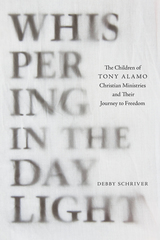
Beginning in the 1960s in California, erstwhile music producer Tony Alamo became interested in authoritarian religion and, along with his charismatic wife, Susan, began gathering followers. By the 1970s, Tony Alamo Christian Ministries had established particularly strong footholds in Arkansas, as well as maintaining outposts in California. The ministry gained a legion of followers, with branches not only in the USA but in places as diverse as Africa and Sri Lanka. Even through their leader’s eventual imprisonment under federal charges (related to transporting minors across state lines for sexual purposes), Alamo’s vision survived—and his community survives him today.
Whispering in the Daylight: The Children of Tony Alamo Christian Ministries and Their Journey to Freedom is based on numerous interviews from group members and, more importantly, on interviews with the children—second and third-generation followers. Author Debby Schriver chronicles how this group was formed, documenting its many abuses and its gradual adoption of cult-like behaviors and practices. Like many cult leaders, Tony Alamo had different faces. The public saw him as a somewhat self-important but harmless music promoter and designer of bedazzling denim jackets. Schriver chronicles firsthand the condemnation, rejection, and torment that the second-generation survivors of Tony Alamo’s abuses experienced. Schriver’s interviews, particularly those with children, illuminate the real horrors of the Alamos’ behavior, ranging from economic exploitation, extreme forced fasts, and beatings, that resulted in permanent injury.
Schriver’s extensive research—including interviews with Tony Alamo himself, harrowing visits to Alamo compounds, and witnessing gut-wrenching confrontations between freed children and their unreformed parents—tells the story of a closed group whose origins and history are unlikely ever to be definitively unraveled.
DEBBY SCHRIVER has spent her career working with students, parents, and staff in the departments of student life and employee training and development at the University of Tennessee, Knoxville. She is the author of In the Footsteps of Champions: The University of Tennessee Lady Volunteers, the First Three Decades, coauthor, with Jenny Moshak, of Ice ’n’ Go: Score in Sports and Life, and coeditor, with Lucia McMahon of To Read My Heart: The Journal of Rachel Van Dyke, 1810–1811.
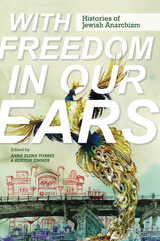
Contributors bring to light the presence and persistence of Jewish anarchism throughout histories of radical labor, women’s studies, political theory, multilingual literature, and ethnic studies.
These essays reveal an ongoing engagement with non-Jewish radical cultures, including the translation practices of the Jewish anarchist press. Jewish anarchists drew from a matrix of secular, cultural, and religious influences, inventing new anarchist forms that ranged from mystical individualism to militantly atheist revolutionary cells.
With Freedom in Our Ears brings together more than a dozen scholars and translators to write the first collaborative history of international, multilingual, and transdisciplinary Jewish anarchism.
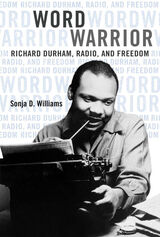
In Word Warrior, award-winning radio producer Sonja D. Williams draws on archives and hard-to-access family records, as well as interviews with family and colleagues like Studs Terkel and Toni Morrison, to illuminate Durham's astounding career. Durham paved the way for black journalists as a dramatist and a star investigative reporter and editor for the pioneering black newspapers the Chicago Defender and Muhammed Speaks. Talented and versatile, he also created the acclaimed radio series Destination Freedom and Here Comes Tomorrow and wrote for popular radio fare like The Lone Ranger. Incredibly, his energies extended still further--to community and labor organizing, advising Chicago mayoral hopeful Harold Washington, and mentoring generations of activists.
Incisive and in-depth, Word Warrior tells the story of a tireless champion of African American freedom, equality, and justice during an epoch that forever changed a nation.
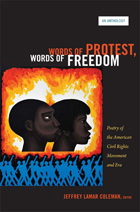
Some of the poems address crucial movement-related events—such as the integration of the Little Rock schools, the murders of Emmett Till and Medgar Evers, the emergence of the Black Panther party, and the race riots of the late 1960s—and key figures, including Martin Luther King Jr., Malcolm X, and John and Robert Kennedy. Other poems speak more broadly to the social and political climate of the times. Along with Jeffrey Lamar Coleman's headnotes, the poems recall the heartbreaking and jubilant moments of a tumultuous era. Altogether, more than 150 poems by approximately 100 poets showcase the breadth of the genre of civil rights poetry.
Selected contributors. Maya Angelou, W. H. Auden, Amiri Baraka, Gwendolyn Brooks, Lucille Clifton Lawrence Ferlinghetti, Allen Ginsberg, Langston Hughes, June Jordan, Philip Levine, Audre Lorde, Robert Lowell, Pauli Murray, Huey P. Newton, Adrienne Rich, Sonia Sanchez, Léopold Sédar Senghor, Derek Walcott, Alice Walker, Yevgeny Yevtushenko
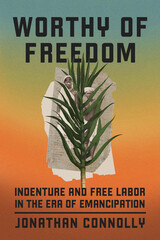
In this book, historian Jonathan Connolly traces the normalization of indenture from its controversial beginnings to its widespread adoption across the British Empire during the nineteenth century. Initially viewed as a covert revival of slavery, indenture caused a scandal in Britain and India. But over time, economic conflict in the colonies altered public perceptions of indenture, now increasingly viewed as a legitimate form of free labor and a means of preserving the promise of abolition. Connolly explains how the large-scale, state-sponsored migration of Indian subjects to work on sugar plantations across Mauritius, British Guiana, and Trinidad transformed both the notion of post-slavery free labor and the political economy of emancipation.
Excavating legal and public debates and tracing practical applications of the law, Connolly carefully reconstructs how the categories of free and unfree labor were made and remade to suit the interests of capital and empire, showing that emancipation was not simply a triumphal event but, rather, a deeply contested process. In so doing, he advances an original interpretation of how indenture changed the meaning of “freedom” in a post-abolition world.
READERS
Browse our collection.
PUBLISHERS
See BiblioVault's publisher services.
STUDENT SERVICES
Files for college accessibility offices.
UChicago Accessibility Resources
home | accessibility | search | about | contact us
BiblioVault ® 2001 - 2024
The University of Chicago Press









